International Law: Ufasia, Federal States Actions and Consequences
VerifiedAdded on 2023/01/18
|10
|2971
|52
Essay
AI Summary
This essay provides a comprehensive analysis of the legality and consequences of the actions of Ufasia and the Federal States under international law, focusing on the principles of 'use of force,' 'state responsibility,' and 'reparation.' It examines the events, including Ufasia's declaration of a holy war, support for violent acts against the Federal States, and the subsequent bombing in Liguria, as well as the Federal States' retaliatory air strikes. The essay explores the relevant articles of the UN Charter, particularly Article 2(4) regarding the prohibition of the use of force, and Article 51 concerning self-defense. It delves into the Caroline formula, the concept of anticipatory self-defense, and the conditions for lawful self-defense. Furthermore, the essay discusses the concept of state responsibility, outlining the conditions for an international wrongful act, attribution of conduct to a state, and the roles of state organs, private individuals, and instructional movements. It also addresses the concept of reparation, including restitution, compensation, satisfaction, and guarantees of non-repetition, as remedies for the harm caused by wrongful acts, referencing relevant conventions and UN guidelines.
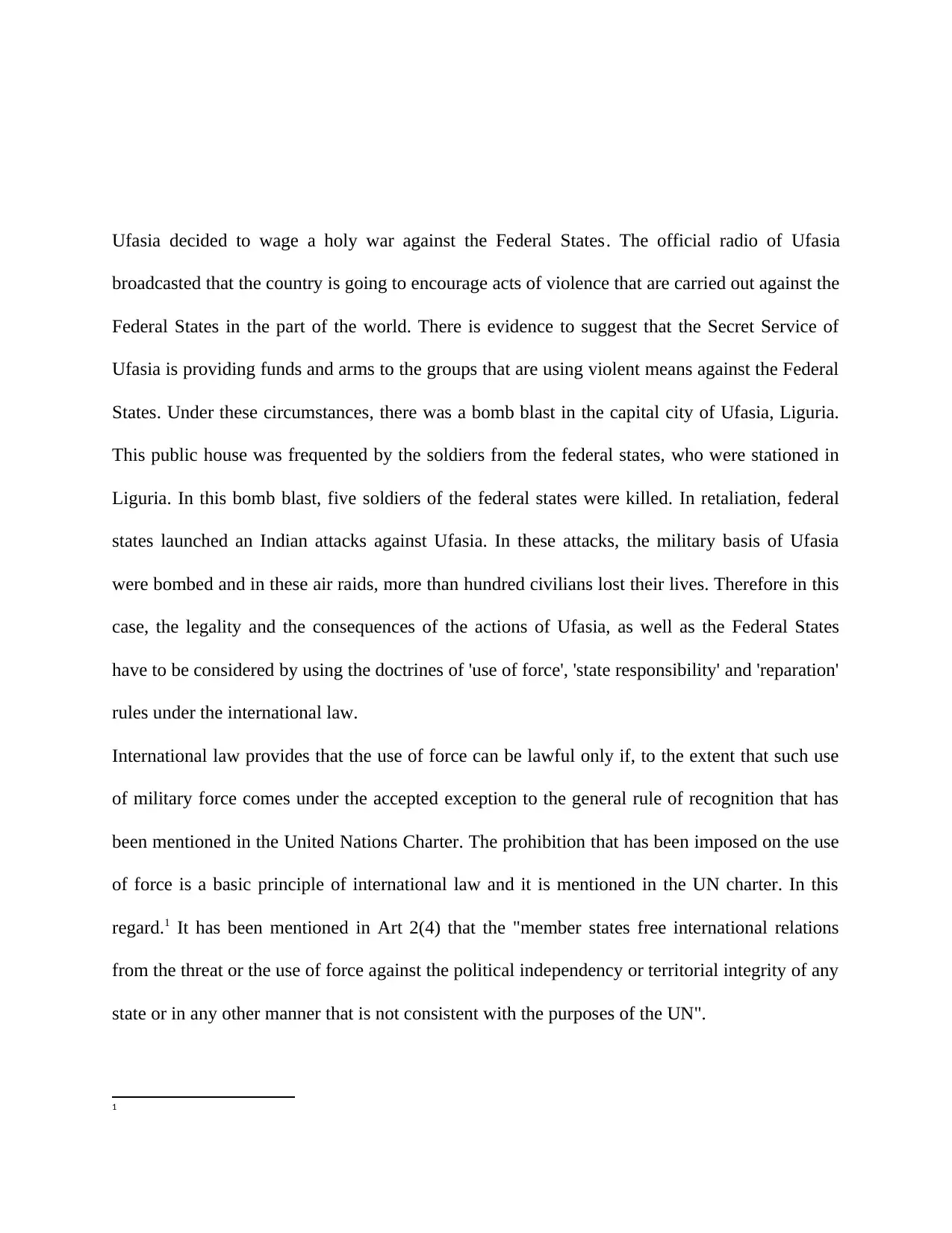
Ufasia decided to wage a holy war against the Federal States. The official radio of Ufasia
broadcasted that the country is going to encourage acts of violence that are carried out against the
Federal States in the part of the world. There is evidence to suggest that the Secret Service of
Ufasia is providing funds and arms to the groups that are using violent means against the Federal
States. Under these circumstances, there was a bomb blast in the capital city of Ufasia, Liguria.
This public house was frequented by the soldiers from the federal states, who were stationed in
Liguria. In this bomb blast, five soldiers of the federal states were killed. In retaliation, federal
states launched an Indian attacks against Ufasia. In these attacks, the military basis of Ufasia
were bombed and in these air raids, more than hundred civilians lost their lives. Therefore in this
case, the legality and the consequences of the actions of Ufasia, as well as the Federal States
have to be considered by using the doctrines of 'use of force', 'state responsibility' and 'reparation'
rules under the international law.
International law provides that the use of force can be lawful only if, to the extent that such use
of military force comes under the accepted exception to the general rule of recognition that has
been mentioned in the United Nations Charter. The prohibition that has been imposed on the use
of force is a basic principle of international law and it is mentioned in the UN charter. In this
regard.1 It has been mentioned in Art 2(4) that the "member states free international relations
from the threat or the use of force against the political independency or territorial integrity of any
state or in any other manner that is not consistent with the purposes of the UN".
1
broadcasted that the country is going to encourage acts of violence that are carried out against the
Federal States in the part of the world. There is evidence to suggest that the Secret Service of
Ufasia is providing funds and arms to the groups that are using violent means against the Federal
States. Under these circumstances, there was a bomb blast in the capital city of Ufasia, Liguria.
This public house was frequented by the soldiers from the federal states, who were stationed in
Liguria. In this bomb blast, five soldiers of the federal states were killed. In retaliation, federal
states launched an Indian attacks against Ufasia. In these attacks, the military basis of Ufasia
were bombed and in these air raids, more than hundred civilians lost their lives. Therefore in this
case, the legality and the consequences of the actions of Ufasia, as well as the Federal States
have to be considered by using the doctrines of 'use of force', 'state responsibility' and 'reparation'
rules under the international law.
International law provides that the use of force can be lawful only if, to the extent that such use
of military force comes under the accepted exception to the general rule of recognition that has
been mentioned in the United Nations Charter. The prohibition that has been imposed on the use
of force is a basic principle of international law and it is mentioned in the UN charter. In this
regard.1 It has been mentioned in Art 2(4) that the "member states free international relations
from the threat or the use of force against the political independency or territorial integrity of any
state or in any other manner that is not consistent with the purposes of the UN".
1
Paraphrase This Document
Need a fresh take? Get an instant paraphrase of this document with our AI Paraphraser
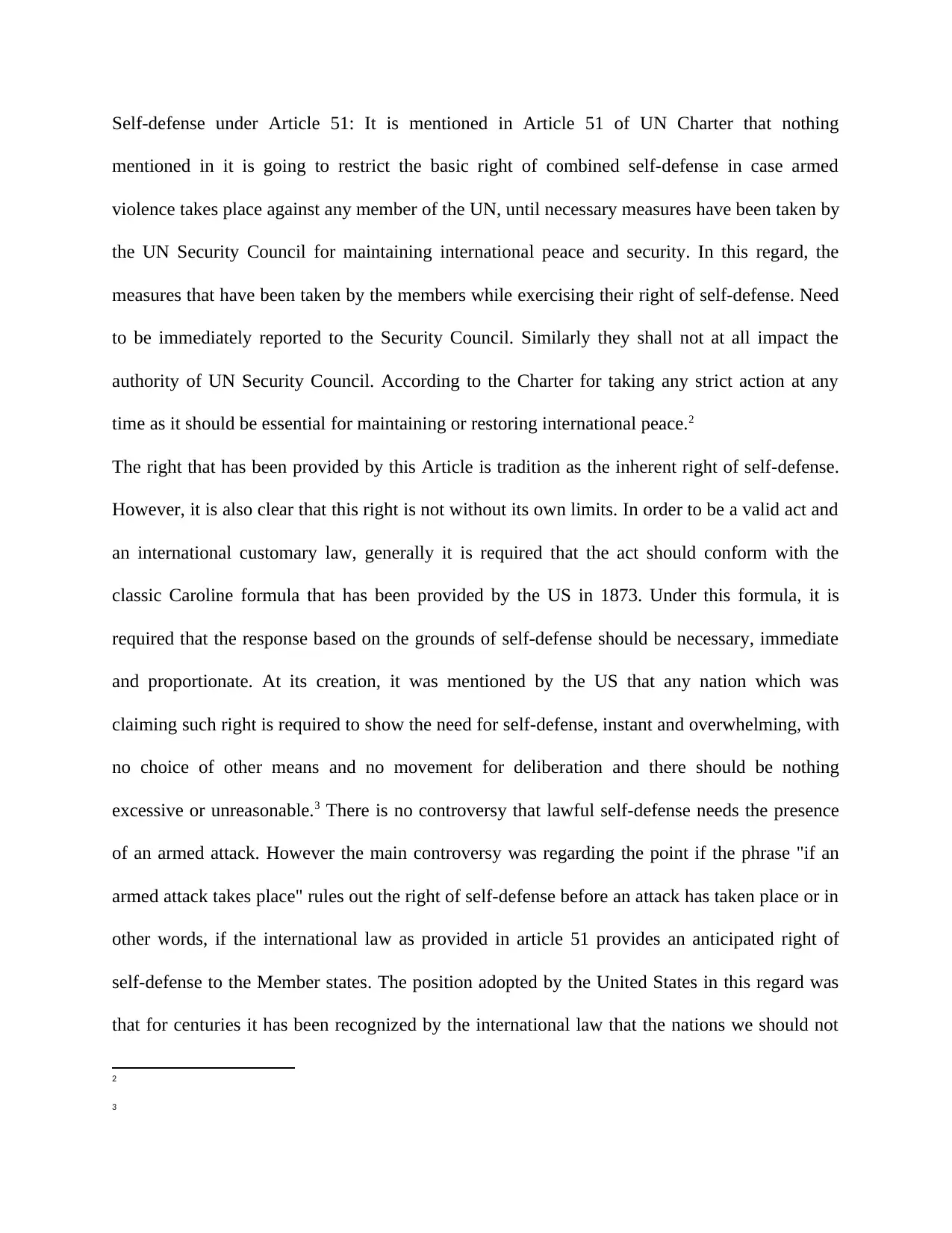
Self-defense under Article 51: It is mentioned in Article 51 of UN Charter that nothing
mentioned in it is going to restrict the basic right of combined self-defense in case armed
violence takes place against any member of the UN, until necessary measures have been taken by
the UN Security Council for maintaining international peace and security. In this regard, the
measures that have been taken by the members while exercising their right of self-defense. Need
to be immediately reported to the Security Council. Similarly they shall not at all impact the
authority of UN Security Council. According to the Charter for taking any strict action at any
time as it should be essential for maintaining or restoring international peace.2
The right that has been provided by this Article is tradition as the inherent right of self-defense.
However, it is also clear that this right is not without its own limits. In order to be a valid act and
an international customary law, generally it is required that the act should conform with the
classic Caroline formula that has been provided by the US in 1873. Under this formula, it is
required that the response based on the grounds of self-defense should be necessary, immediate
and proportionate. At its creation, it was mentioned by the US that any nation which was
claiming such right is required to show the need for self-defense, instant and overwhelming, with
no choice of other means and no movement for deliberation and there should be nothing
excessive or unreasonable.3 There is no controversy that lawful self-defense needs the presence
of an armed attack. However the main controversy was regarding the point if the phrase "if an
armed attack takes place" rules out the right of self-defense before an attack has taken place or in
other words, if the international law as provided in article 51 provides an anticipated right of
self-defense to the Member states. The position adopted by the United States in this regard was
that for centuries it has been recognized by the international law that the nations we should not
2
3
mentioned in it is going to restrict the basic right of combined self-defense in case armed
violence takes place against any member of the UN, until necessary measures have been taken by
the UN Security Council for maintaining international peace and security. In this regard, the
measures that have been taken by the members while exercising their right of self-defense. Need
to be immediately reported to the Security Council. Similarly they shall not at all impact the
authority of UN Security Council. According to the Charter for taking any strict action at any
time as it should be essential for maintaining or restoring international peace.2
The right that has been provided by this Article is tradition as the inherent right of self-defense.
However, it is also clear that this right is not without its own limits. In order to be a valid act and
an international customary law, generally it is required that the act should conform with the
classic Caroline formula that has been provided by the US in 1873. Under this formula, it is
required that the response based on the grounds of self-defense should be necessary, immediate
and proportionate. At its creation, it was mentioned by the US that any nation which was
claiming such right is required to show the need for self-defense, instant and overwhelming, with
no choice of other means and no movement for deliberation and there should be nothing
excessive or unreasonable.3 There is no controversy that lawful self-defense needs the presence
of an armed attack. However the main controversy was regarding the point if the phrase "if an
armed attack takes place" rules out the right of self-defense before an attack has taken place or in
other words, if the international law as provided in article 51 provides an anticipated right of
self-defense to the Member states. The position adopted by the United States in this regard was
that for centuries it has been recognized by the international law that the nations we should not
2
3
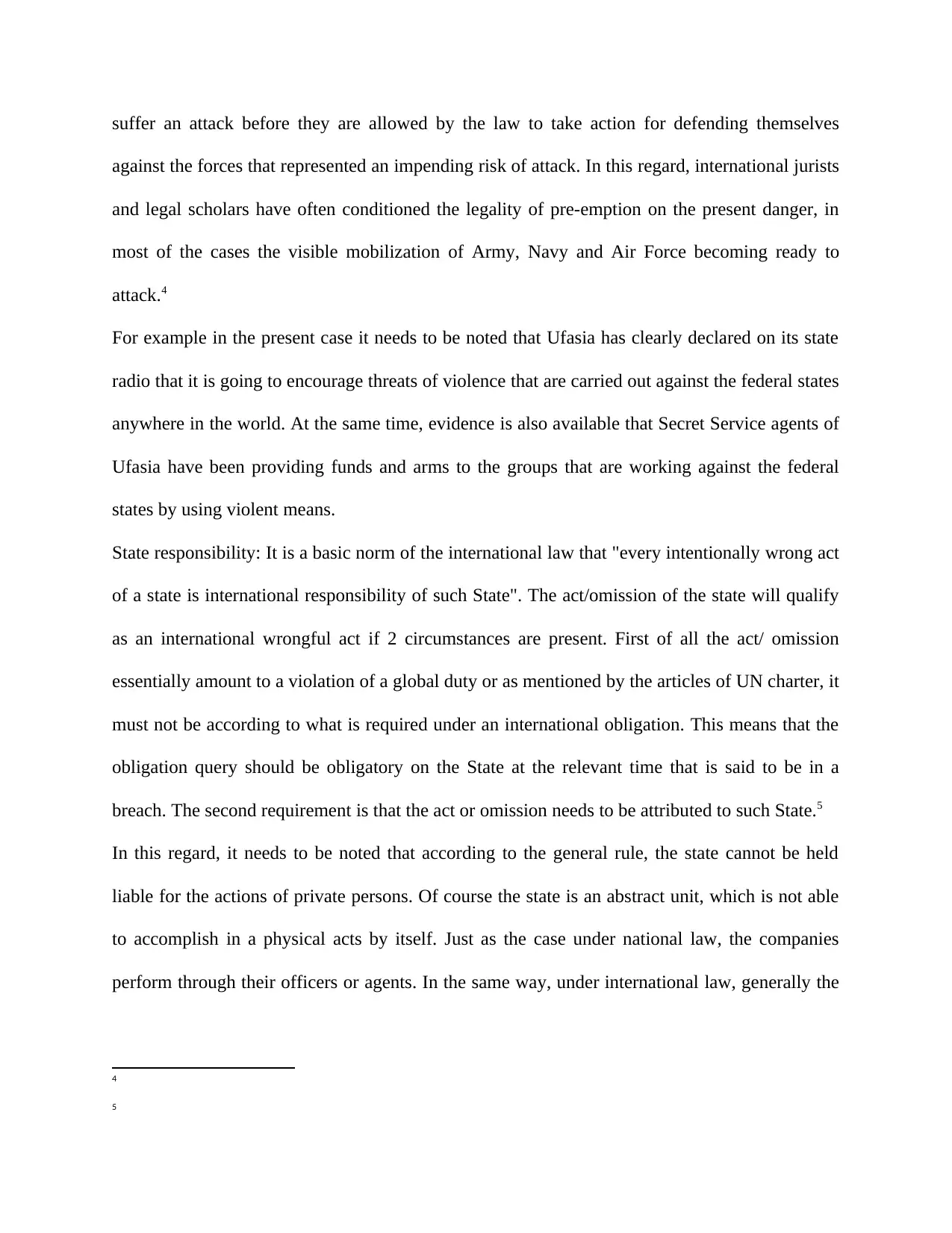
suffer an attack before they are allowed by the law to take action for defending themselves
against the forces that represented an impending risk of attack. In this regard, international jurists
and legal scholars have often conditioned the legality of pre-emption on the present danger, in
most of the cases the visible mobilization of Army, Navy and Air Force becoming ready to
attack.4
For example in the present case it needs to be noted that Ufasia has clearly declared on its state
radio that it is going to encourage threats of violence that are carried out against the federal states
anywhere in the world. At the same time, evidence is also available that Secret Service agents of
Ufasia have been providing funds and arms to the groups that are working against the federal
states by using violent means.
State responsibility: It is a basic norm of the international law that "every intentionally wrong act
of a state is international responsibility of such State". The act/omission of the state will qualify
as an international wrongful act if 2 circumstances are present. First of all the act/ omission
essentially amount to a violation of a global duty or as mentioned by the articles of UN charter, it
must not be according to what is required under an international obligation. This means that the
obligation query should be obligatory on the State at the relevant time that is said to be in a
breach. The second requirement is that the act or omission needs to be attributed to such State.5
In this regard, it needs to be noted that according to the general rule, the state cannot be held
liable for the actions of private persons. Of course the state is an abstract unit, which is not able
to accomplish in a physical acts by itself. Just as the case under national law, the companies
perform through their officers or agents. In the same way, under international law, generally the
4
5
against the forces that represented an impending risk of attack. In this regard, international jurists
and legal scholars have often conditioned the legality of pre-emption on the present danger, in
most of the cases the visible mobilization of Army, Navy and Air Force becoming ready to
attack.4
For example in the present case it needs to be noted that Ufasia has clearly declared on its state
radio that it is going to encourage threats of violence that are carried out against the federal states
anywhere in the world. At the same time, evidence is also available that Secret Service agents of
Ufasia have been providing funds and arms to the groups that are working against the federal
states by using violent means.
State responsibility: It is a basic norm of the international law that "every intentionally wrong act
of a state is international responsibility of such State". The act/omission of the state will qualify
as an international wrongful act if 2 circumstances are present. First of all the act/ omission
essentially amount to a violation of a global duty or as mentioned by the articles of UN charter, it
must not be according to what is required under an international obligation. This means that the
obligation query should be obligatory on the State at the relevant time that is said to be in a
breach. The second requirement is that the act or omission needs to be attributed to such State.5
In this regard, it needs to be noted that according to the general rule, the state cannot be held
liable for the actions of private persons. Of course the state is an abstract unit, which is not able
to accomplish in a physical acts by itself. Just as the case under national law, the companies
perform through their officers or agents. In the same way, under international law, generally the
4
5
⊘ This is a preview!⊘
Do you want full access?
Subscribe today to unlock all pages.

Trusted by 1+ million students worldwide
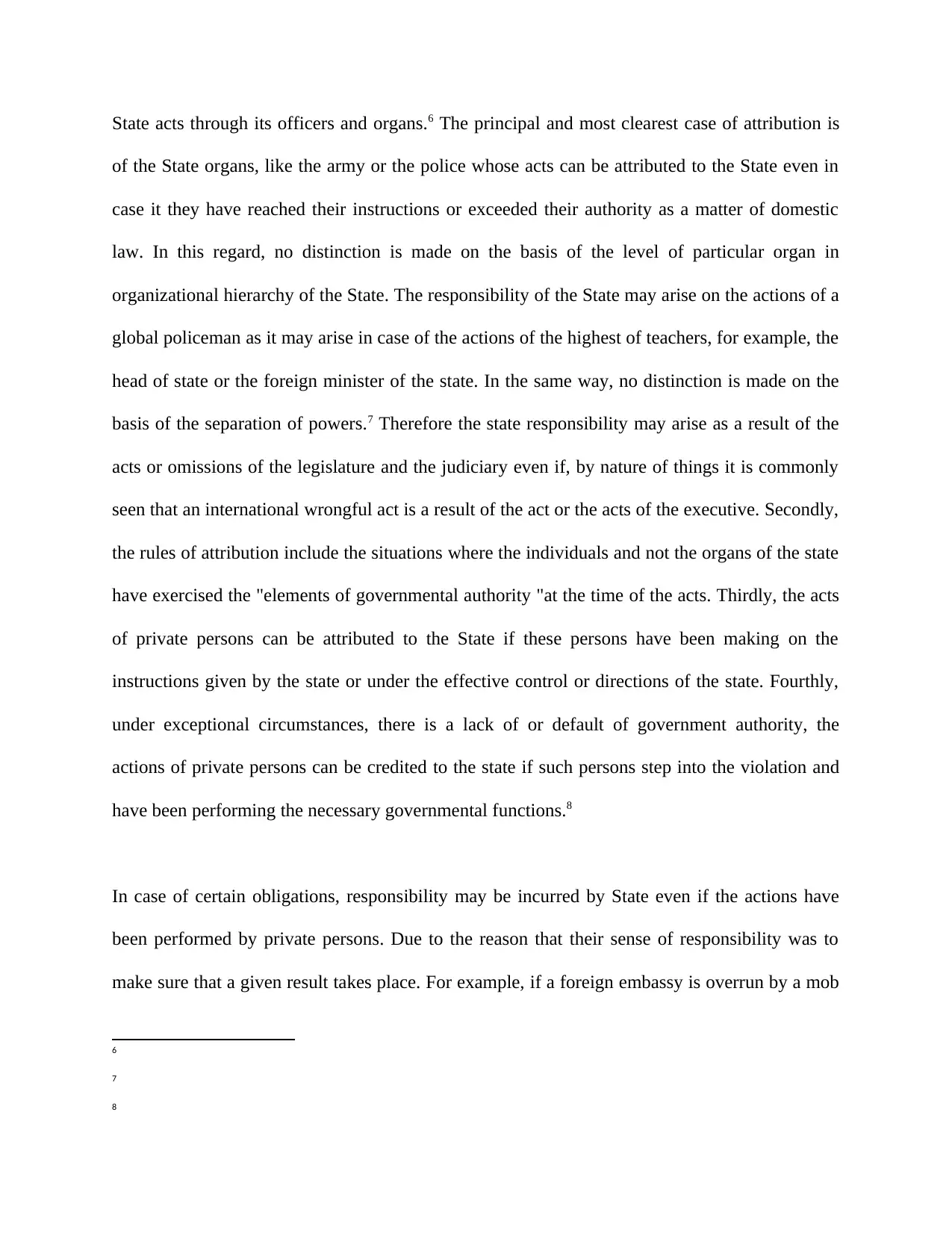
State acts through its officers and organs.6 The principal and most clearest case of attribution is
of the State organs, like the army or the police whose acts can be attributed to the State even in
case it they have reached their instructions or exceeded their authority as a matter of domestic
law. In this regard, no distinction is made on the basis of the level of particular organ in
organizational hierarchy of the State. The responsibility of the State may arise on the actions of a
global policeman as it may arise in case of the actions of the highest of teachers, for example, the
head of state or the foreign minister of the state. In the same way, no distinction is made on the
basis of the separation of powers.7 Therefore the state responsibility may arise as a result of the
acts or omissions of the legislature and the judiciary even if, by nature of things it is commonly
seen that an international wrongful act is a result of the act or the acts of the executive. Secondly,
the rules of attribution include the situations where the individuals and not the organs of the state
have exercised the "elements of governmental authority "at the time of the acts. Thirdly, the acts
of private persons can be attributed to the State if these persons have been making on the
instructions given by the state or under the effective control or directions of the state. Fourthly,
under exceptional circumstances, there is a lack of or default of government authority, the
actions of private persons can be credited to the state if such persons step into the violation and
have been performing the necessary governmental functions.8
In case of certain obligations, responsibility may be incurred by State even if the actions have
been performed by private persons. Due to the reason that their sense of responsibility was to
make sure that a given result takes place. For example, if a foreign embassy is overrun by a mob
6
7
8
of the State organs, like the army or the police whose acts can be attributed to the State even in
case it they have reached their instructions or exceeded their authority as a matter of domestic
law. In this regard, no distinction is made on the basis of the level of particular organ in
organizational hierarchy of the State. The responsibility of the State may arise on the actions of a
global policeman as it may arise in case of the actions of the highest of teachers, for example, the
head of state or the foreign minister of the state. In the same way, no distinction is made on the
basis of the separation of powers.7 Therefore the state responsibility may arise as a result of the
acts or omissions of the legislature and the judiciary even if, by nature of things it is commonly
seen that an international wrongful act is a result of the act or the acts of the executive. Secondly,
the rules of attribution include the situations where the individuals and not the organs of the state
have exercised the "elements of governmental authority "at the time of the acts. Thirdly, the acts
of private persons can be attributed to the State if these persons have been making on the
instructions given by the state or under the effective control or directions of the state. Fourthly,
under exceptional circumstances, there is a lack of or default of government authority, the
actions of private persons can be credited to the state if such persons step into the violation and
have been performing the necessary governmental functions.8
In case of certain obligations, responsibility may be incurred by State even if the actions have
been performed by private persons. Due to the reason that their sense of responsibility was to
make sure that a given result takes place. For example, if a foreign embassy is overrun by a mob
6
7
8
Paraphrase This Document
Need a fresh take? Get an instant paraphrase of this document with our AI Paraphraser
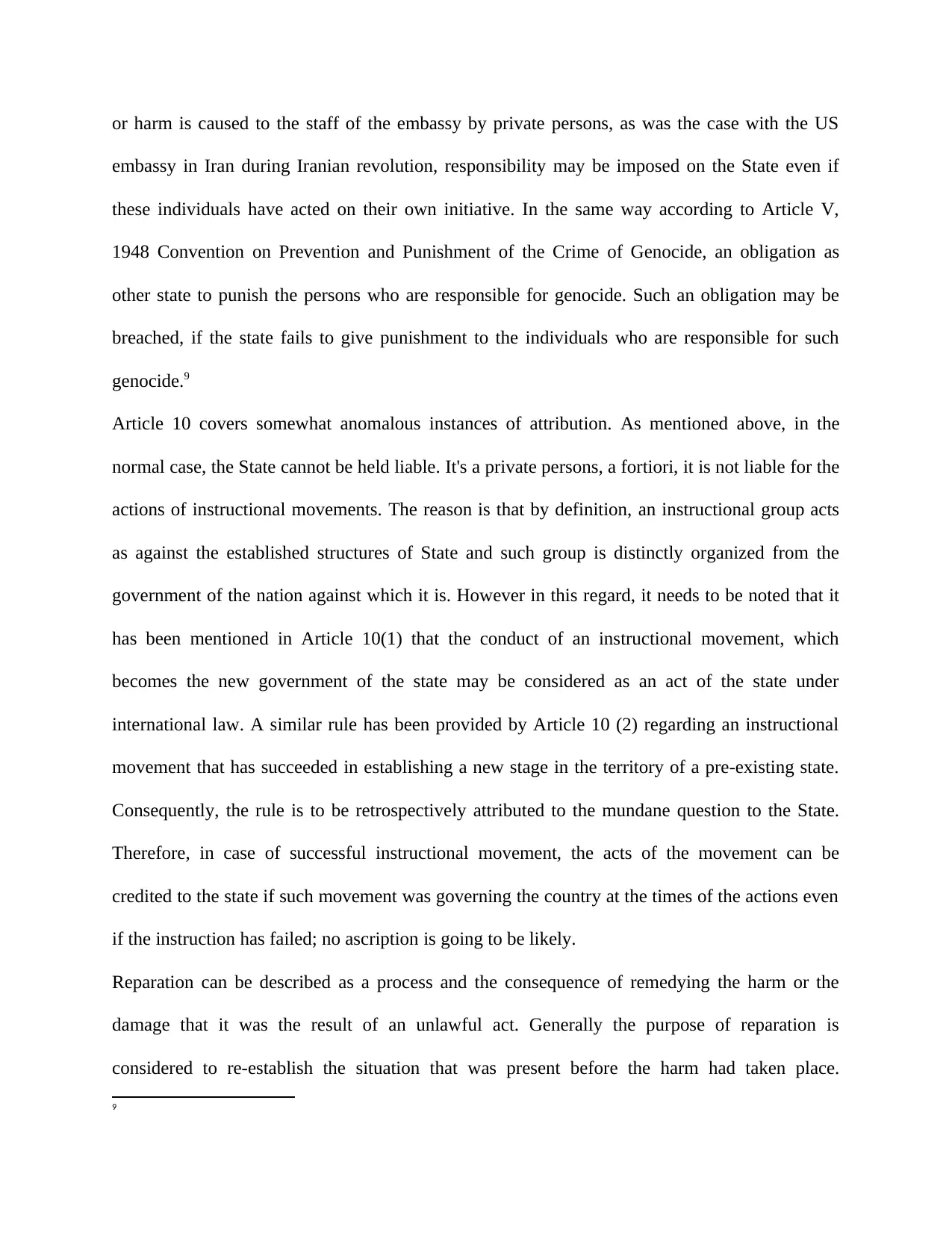
or harm is caused to the staff of the embassy by private persons, as was the case with the US
embassy in Iran during Iranian revolution, responsibility may be imposed on the State even if
these individuals have acted on their own initiative. In the same way according to Article V,
1948 Convention on Prevention and Punishment of the Crime of Genocide, an obligation as
other state to punish the persons who are responsible for genocide. Such an obligation may be
breached, if the state fails to give punishment to the individuals who are responsible for such
genocide.9
Article 10 covers somewhat anomalous instances of attribution. As mentioned above, in the
normal case, the State cannot be held liable. It's a private persons, a fortiori, it is not liable for the
actions of instructional movements. The reason is that by definition, an instructional group acts
as against the established structures of State and such group is distinctly organized from the
government of the nation against which it is. However in this regard, it needs to be noted that it
has been mentioned in Article 10(1) that the conduct of an instructional movement, which
becomes the new government of the state may be considered as an act of the state under
international law. A similar rule has been provided by Article 10 (2) regarding an instructional
movement that has succeeded in establishing a new stage in the territory of a pre-existing state.
Consequently, the rule is to be retrospectively attributed to the mundane question to the State.
Therefore, in case of successful instructional movement, the acts of the movement can be
credited to the state if such movement was governing the country at the times of the actions even
if the instruction has failed; no ascription is going to be likely.
Reparation can be described as a process and the consequence of remedying the harm or the
damage that it was the result of an unlawful act. Generally the purpose of reparation is
considered to re-establish the situation that was present before the harm had taken place.
9
embassy in Iran during Iranian revolution, responsibility may be imposed on the State even if
these individuals have acted on their own initiative. In the same way according to Article V,
1948 Convention on Prevention and Punishment of the Crime of Genocide, an obligation as
other state to punish the persons who are responsible for genocide. Such an obligation may be
breached, if the state fails to give punishment to the individuals who are responsible for such
genocide.9
Article 10 covers somewhat anomalous instances of attribution. As mentioned above, in the
normal case, the State cannot be held liable. It's a private persons, a fortiori, it is not liable for the
actions of instructional movements. The reason is that by definition, an instructional group acts
as against the established structures of State and such group is distinctly organized from the
government of the nation against which it is. However in this regard, it needs to be noted that it
has been mentioned in Article 10(1) that the conduct of an instructional movement, which
becomes the new government of the state may be considered as an act of the state under
international law. A similar rule has been provided by Article 10 (2) regarding an instructional
movement that has succeeded in establishing a new stage in the territory of a pre-existing state.
Consequently, the rule is to be retrospectively attributed to the mundane question to the State.
Therefore, in case of successful instructional movement, the acts of the movement can be
credited to the state if such movement was governing the country at the times of the actions even
if the instruction has failed; no ascription is going to be likely.
Reparation can be described as a process and the consequence of remedying the harm or the
damage that it was the result of an unlawful act. Generally the purpose of reparation is
considered to re-establish the situation that was present before the harm had taken place.
9
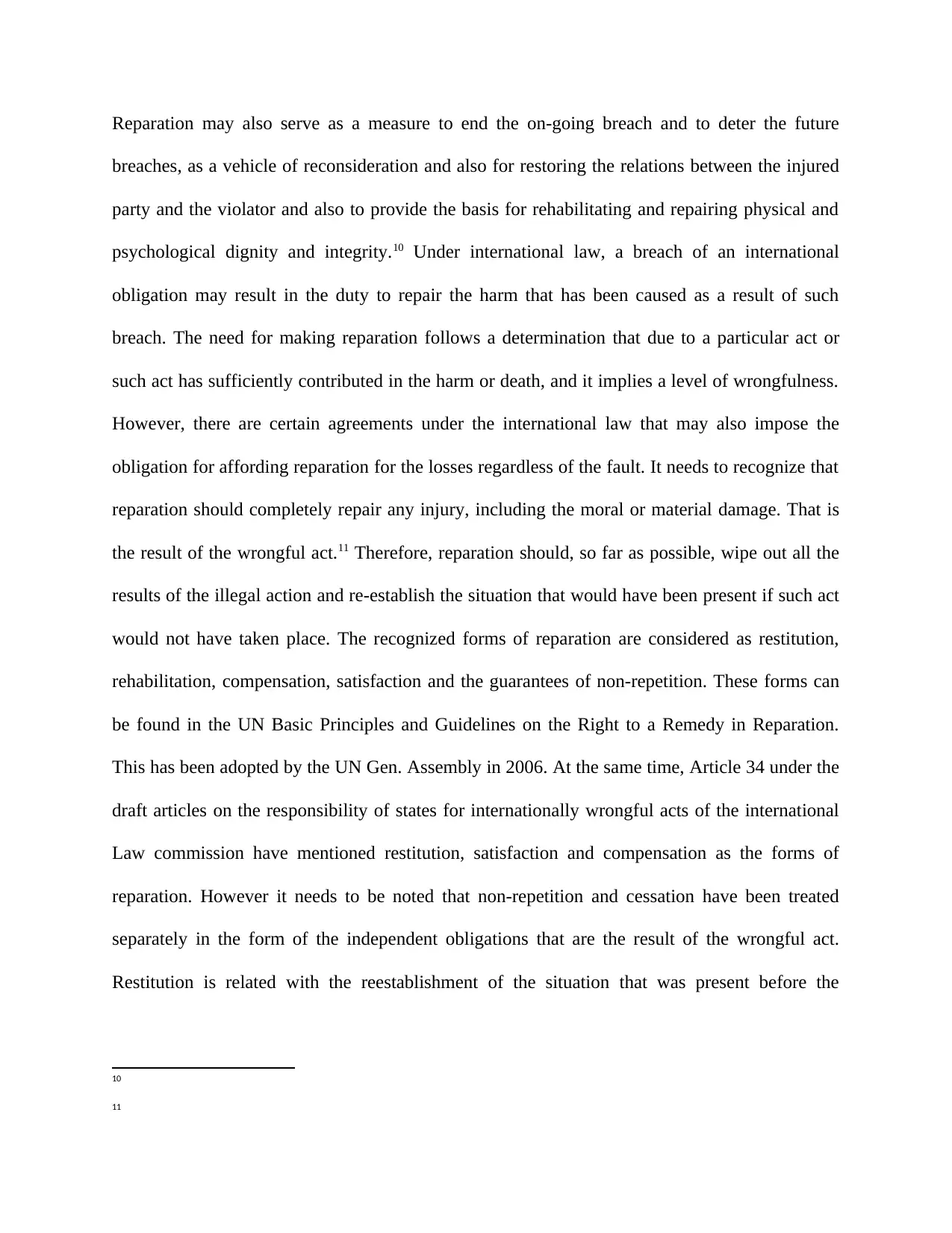
Reparation may also serve as a measure to end the on-going breach and to deter the future
breaches, as a vehicle of reconsideration and also for restoring the relations between the injured
party and the violator and also to provide the basis for rehabilitating and repairing physical and
psychological dignity and integrity.10 Under international law, a breach of an international
obligation may result in the duty to repair the harm that has been caused as a result of such
breach. The need for making reparation follows a determination that due to a particular act or
such act has sufficiently contributed in the harm or death, and it implies a level of wrongfulness.
However, there are certain agreements under the international law that may also impose the
obligation for affording reparation for the losses regardless of the fault. It needs to recognize that
reparation should completely repair any injury, including the moral or material damage. That is
the result of the wrongful act.11 Therefore, reparation should, so far as possible, wipe out all the
results of the illegal action and re-establish the situation that would have been present if such act
would not have taken place. The recognized forms of reparation are considered as restitution,
rehabilitation, compensation, satisfaction and the guarantees of non-repetition. These forms can
be found in the UN Basic Principles and Guidelines on the Right to a Remedy in Reparation.
This has been adopted by the UN Gen. Assembly in 2006. At the same time, Article 34 under the
draft articles on the responsibility of states for internationally wrongful acts of the international
Law commission have mentioned restitution, satisfaction and compensation as the forms of
reparation. However it needs to be noted that non-repetition and cessation have been treated
separately in the form of the independent obligations that are the result of the wrongful act.
Restitution is related with the reestablishment of the situation that was present before the
10
11
breaches, as a vehicle of reconsideration and also for restoring the relations between the injured
party and the violator and also to provide the basis for rehabilitating and repairing physical and
psychological dignity and integrity.10 Under international law, a breach of an international
obligation may result in the duty to repair the harm that has been caused as a result of such
breach. The need for making reparation follows a determination that due to a particular act or
such act has sufficiently contributed in the harm or death, and it implies a level of wrongfulness.
However, there are certain agreements under the international law that may also impose the
obligation for affording reparation for the losses regardless of the fault. It needs to recognize that
reparation should completely repair any injury, including the moral or material damage. That is
the result of the wrongful act.11 Therefore, reparation should, so far as possible, wipe out all the
results of the illegal action and re-establish the situation that would have been present if such act
would not have taken place. The recognized forms of reparation are considered as restitution,
rehabilitation, compensation, satisfaction and the guarantees of non-repetition. These forms can
be found in the UN Basic Principles and Guidelines on the Right to a Remedy in Reparation.
This has been adopted by the UN Gen. Assembly in 2006. At the same time, Article 34 under the
draft articles on the responsibility of states for internationally wrongful acts of the international
Law commission have mentioned restitution, satisfaction and compensation as the forms of
reparation. However it needs to be noted that non-repetition and cessation have been treated
separately in the form of the independent obligations that are the result of the wrongful act.
Restitution is related with the reestablishment of the situation that was present before the
10
11
⊘ This is a preview!⊘
Do you want full access?
Subscribe today to unlock all pages.

Trusted by 1+ million students worldwide
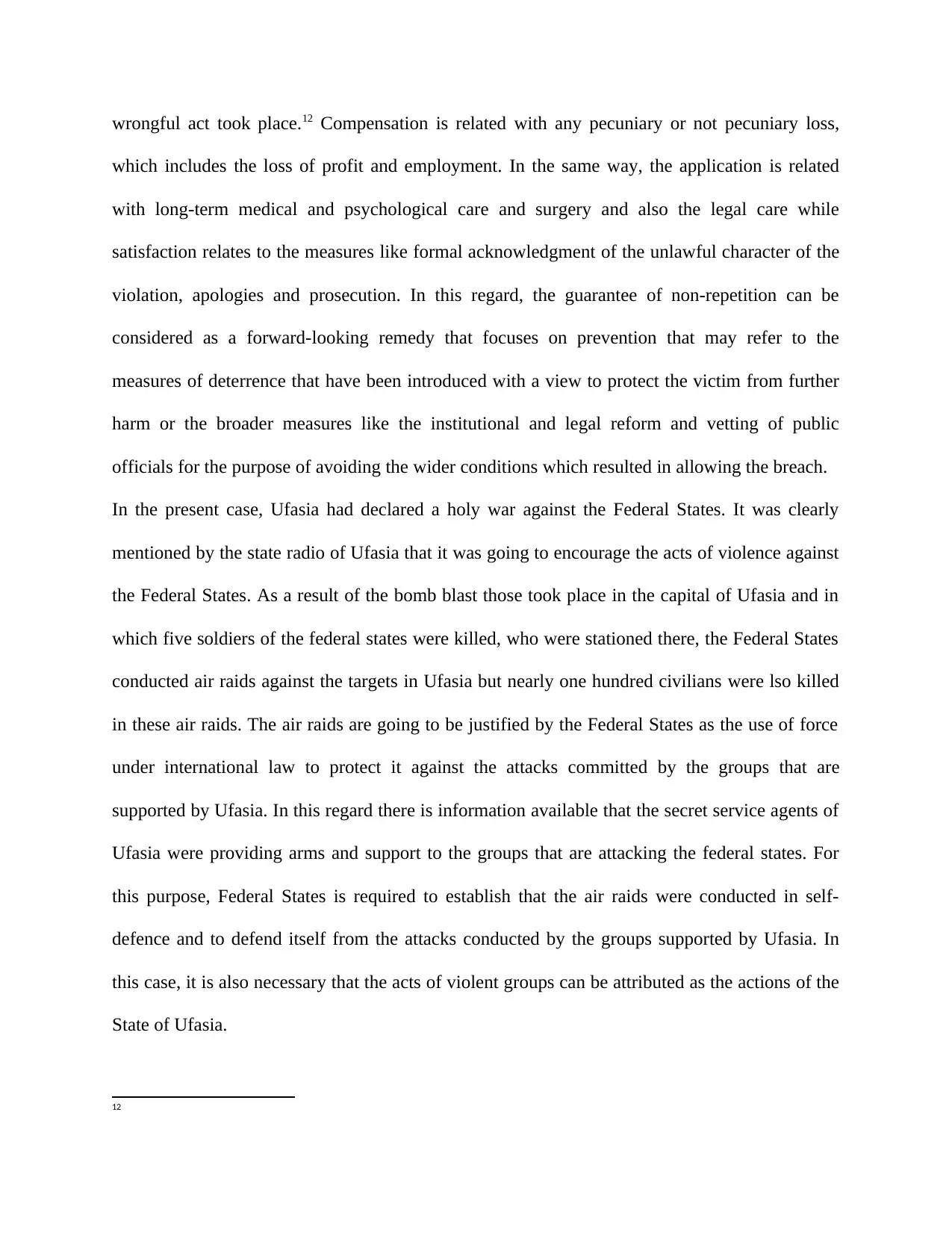
wrongful act took place.12 Compensation is related with any pecuniary or not pecuniary loss,
which includes the loss of profit and employment. In the same way, the application is related
with long-term medical and psychological care and surgery and also the legal care while
satisfaction relates to the measures like formal acknowledgment of the unlawful character of the
violation, apologies and prosecution. In this regard, the guarantee of non-repetition can be
considered as a forward-looking remedy that focuses on prevention that may refer to the
measures of deterrence that have been introduced with a view to protect the victim from further
harm or the broader measures like the institutional and legal reform and vetting of public
officials for the purpose of avoiding the wider conditions which resulted in allowing the breach.
In the present case, Ufasia had declared a holy war against the Federal States. It was clearly
mentioned by the state radio of Ufasia that it was going to encourage the acts of violence against
the Federal States. As a result of the bomb blast those took place in the capital of Ufasia and in
which five soldiers of the federal states were killed, who were stationed there, the Federal States
conducted air raids against the targets in Ufasia but nearly one hundred civilians were lso killed
in these air raids. The air raids are going to be justified by the Federal States as the use of force
under international law to protect it against the attacks committed by the groups that are
supported by Ufasia. In this regard there is information available that the secret service agents of
Ufasia were providing arms and support to the groups that are attacking the federal states. For
this purpose, Federal States is required to establish that the air raids were conducted in self-
defence and to defend itself from the attacks conducted by the groups supported by Ufasia. In
this case, it is also necessary that the acts of violent groups can be attributed as the actions of the
State of Ufasia.
12
which includes the loss of profit and employment. In the same way, the application is related
with long-term medical and psychological care and surgery and also the legal care while
satisfaction relates to the measures like formal acknowledgment of the unlawful character of the
violation, apologies and prosecution. In this regard, the guarantee of non-repetition can be
considered as a forward-looking remedy that focuses on prevention that may refer to the
measures of deterrence that have been introduced with a view to protect the victim from further
harm or the broader measures like the institutional and legal reform and vetting of public
officials for the purpose of avoiding the wider conditions which resulted in allowing the breach.
In the present case, Ufasia had declared a holy war against the Federal States. It was clearly
mentioned by the state radio of Ufasia that it was going to encourage the acts of violence against
the Federal States. As a result of the bomb blast those took place in the capital of Ufasia and in
which five soldiers of the federal states were killed, who were stationed there, the Federal States
conducted air raids against the targets in Ufasia but nearly one hundred civilians were lso killed
in these air raids. The air raids are going to be justified by the Federal States as the use of force
under international law to protect it against the attacks committed by the groups that are
supported by Ufasia. In this regard there is information available that the secret service agents of
Ufasia were providing arms and support to the groups that are attacking the federal states. For
this purpose, Federal States is required to establish that the air raids were conducted in self-
defence and to defend itself from the attacks conducted by the groups supported by Ufasia. In
this case, it is also necessary that the acts of violent groups can be attributed as the actions of the
State of Ufasia.
12
Paraphrase This Document
Need a fresh take? Get an instant paraphrase of this document with our AI Paraphraser
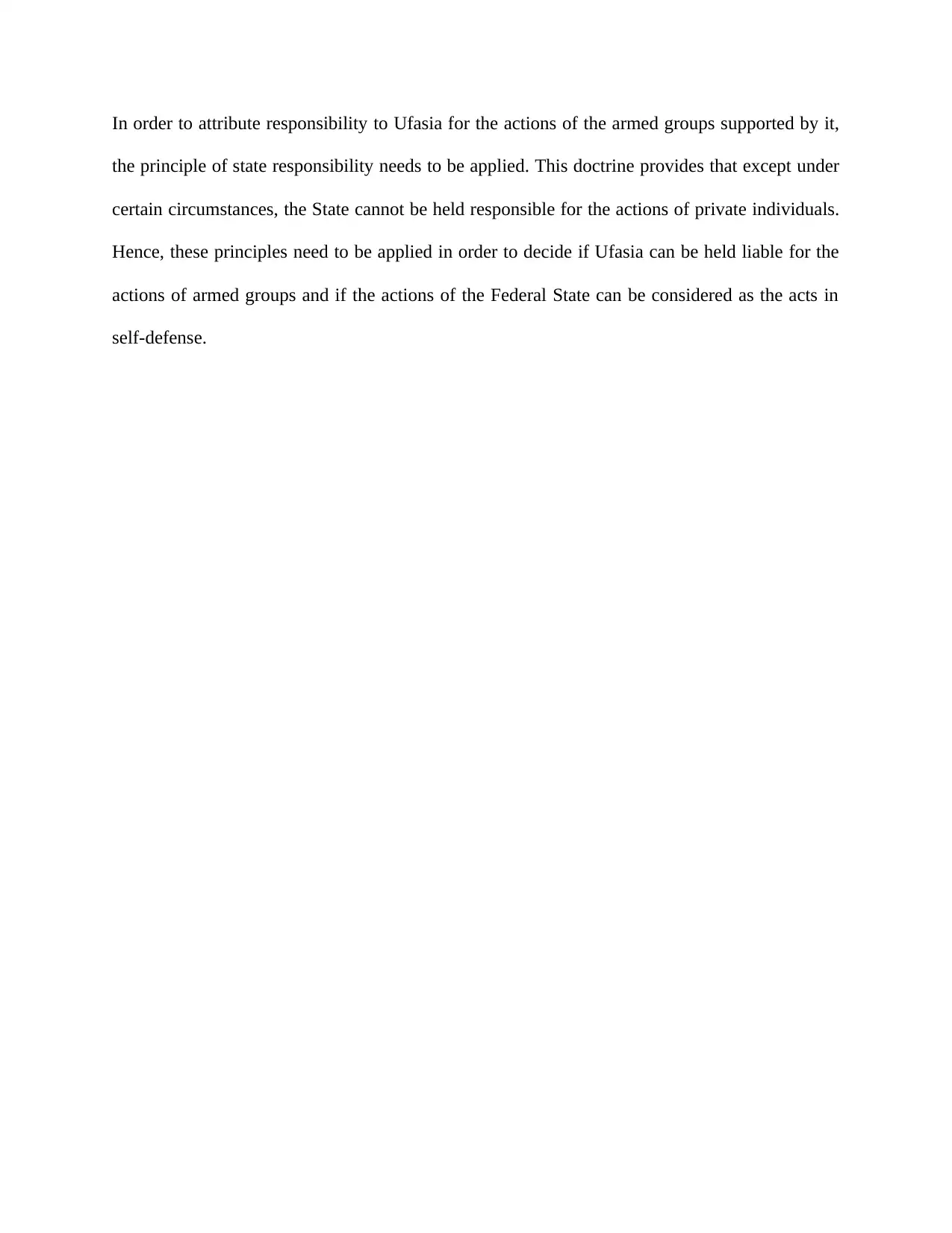
In order to attribute responsibility to Ufasia for the actions of the armed groups supported by it,
the principle of state responsibility needs to be applied. This doctrine provides that except under
certain circumstances, the State cannot be held responsible for the actions of private individuals.
Hence, these principles need to be applied in order to decide if Ufasia can be held liable for the
actions of armed groups and if the actions of the Federal State can be considered as the acts in
self-defense.
the principle of state responsibility needs to be applied. This doctrine provides that except under
certain circumstances, the State cannot be held responsible for the actions of private individuals.
Hence, these principles need to be applied in order to decide if Ufasia can be held liable for the
actions of armed groups and if the actions of the Federal State can be considered as the acts in
self-defense.
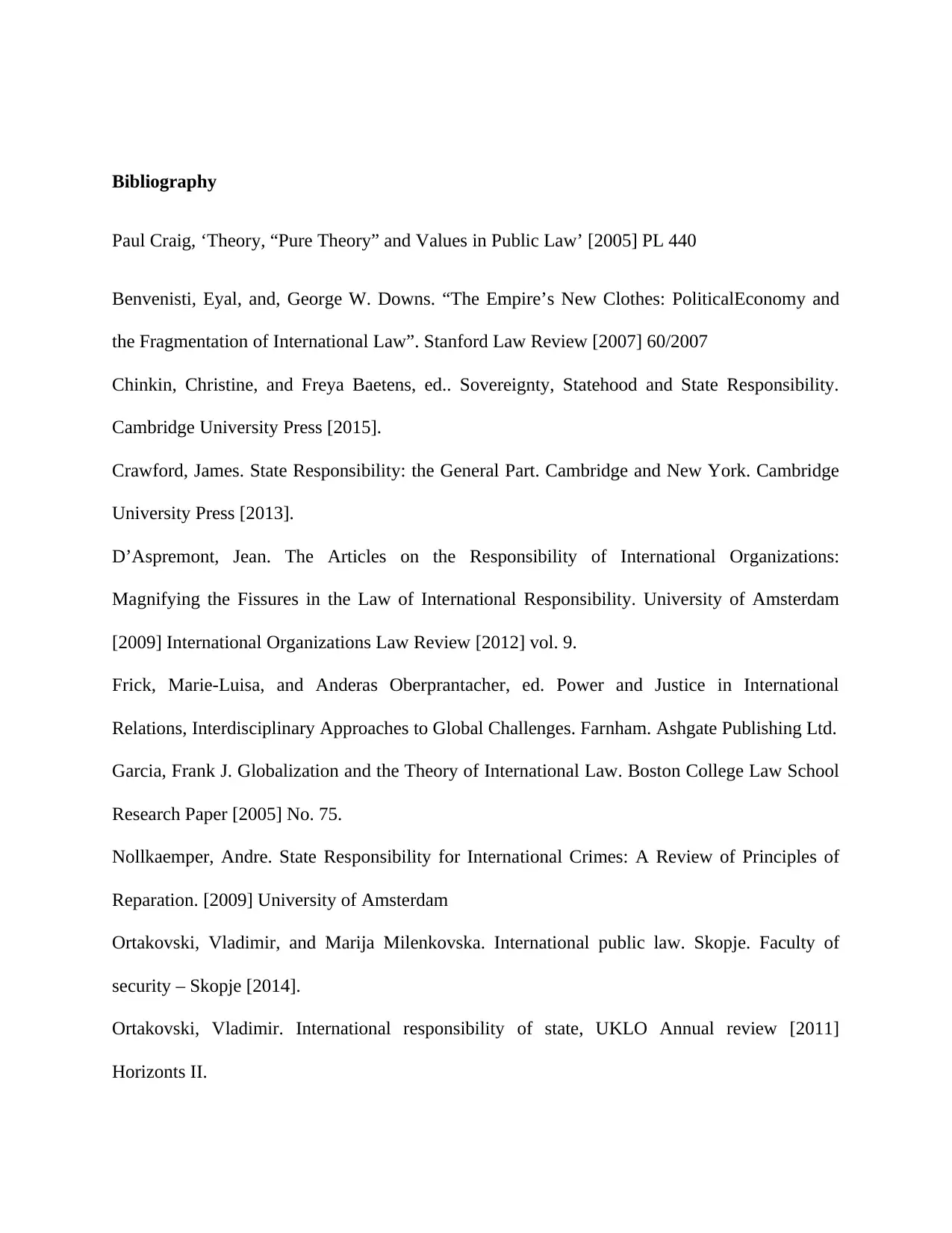
Bibliography
Paul Craig, ‘Theory, “Pure Theory” and Values in Public Law’ [2005] PL 440
Benvenisti, Eyal, and, George W. Downs. “The Empire’s New Clothes: PoliticalEconomy and
the Fragmentation of International Law”. Stanford Law Review [2007] 60/2007
Chinkin, Christine, and Freya Baetens, ed.. Sovereignty, Statehood and State Responsibility.
Cambridge University Press [2015].
Crawford, James. State Responsibility: the General Part. Cambridge and New York. Cambridge
University Press [2013].
D’Aspremont, Jean. The Articles on the Responsibility of International Organizations:
Magnifying the Fissures in the Law of International Responsibility. University of Amsterdam
[2009] International Organizations Law Review [2012] vol. 9.
Frick, Marie-Luisa, and Anderas Oberprantacher, ed. Power and Justice in International
Relations, Interdisciplinary Approaches to Global Challenges. Farnham. Ashgate Publishing Ltd.
Garcia, Frank J. Globalization and the Theory of International Law. Boston College Law School
Research Paper [2005] No. 75.
Nollkaemper, Andre. State Responsibility for International Crimes: A Review of Principles of
Reparation. [2009] University of Amsterdam
Ortakovski, Vladimir, and Marija Milenkovska. International public law. Skopje. Faculty of
security – Skopje [2014].
Ortakovski, Vladimir. International responsibility of state, UKLO Annual review [2011]
Horizonts II.
Paul Craig, ‘Theory, “Pure Theory” and Values in Public Law’ [2005] PL 440
Benvenisti, Eyal, and, George W. Downs. “The Empire’s New Clothes: PoliticalEconomy and
the Fragmentation of International Law”. Stanford Law Review [2007] 60/2007
Chinkin, Christine, and Freya Baetens, ed.. Sovereignty, Statehood and State Responsibility.
Cambridge University Press [2015].
Crawford, James. State Responsibility: the General Part. Cambridge and New York. Cambridge
University Press [2013].
D’Aspremont, Jean. The Articles on the Responsibility of International Organizations:
Magnifying the Fissures in the Law of International Responsibility. University of Amsterdam
[2009] International Organizations Law Review [2012] vol. 9.
Frick, Marie-Luisa, and Anderas Oberprantacher, ed. Power and Justice in International
Relations, Interdisciplinary Approaches to Global Challenges. Farnham. Ashgate Publishing Ltd.
Garcia, Frank J. Globalization and the Theory of International Law. Boston College Law School
Research Paper [2005] No. 75.
Nollkaemper, Andre. State Responsibility for International Crimes: A Review of Principles of
Reparation. [2009] University of Amsterdam
Ortakovski, Vladimir, and Marija Milenkovska. International public law. Skopje. Faculty of
security – Skopje [2014].
Ortakovski, Vladimir. International responsibility of state, UKLO Annual review [2011]
Horizonts II.
⊘ This is a preview!⊘
Do you want full access?
Subscribe today to unlock all pages.

Trusted by 1+ million students worldwide
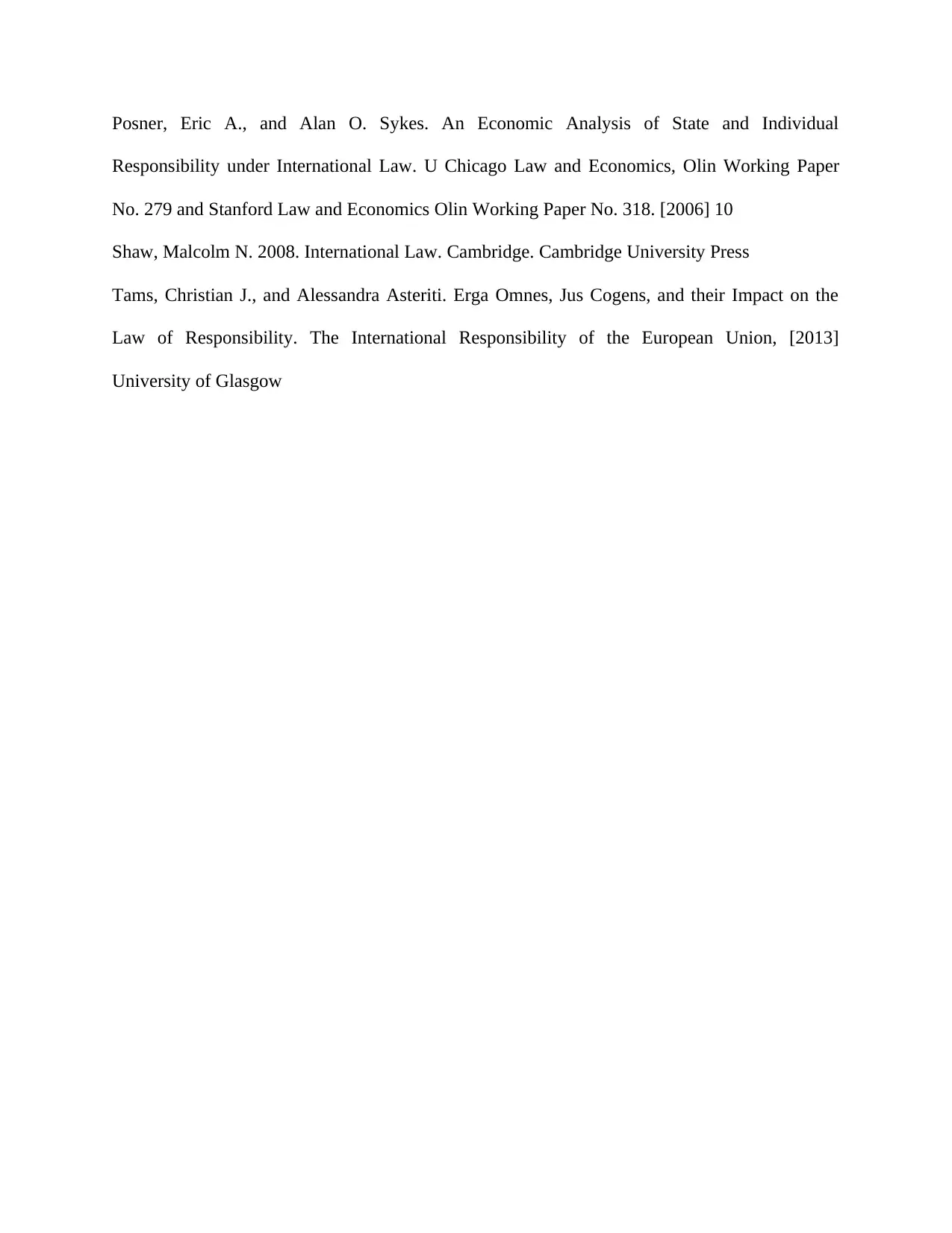
Posner, Eric A., and Alan O. Sykes. An Economic Analysis of State and Individual
Responsibility under International Law. U Chicago Law and Economics, Olin Working Paper
No. 279 and Stanford Law and Economics Olin Working Paper No. 318. [2006] 10
Shaw, Malcolm N. 2008. International Law. Cambridge. Cambridge University Press
Tams, Christian J., and Alessandra Asteriti. Erga Omnes, Jus Cogens, and their Impact on the
Law of Responsibility. The International Responsibility of the European Union, [2013]
University of Glasgow
Responsibility under International Law. U Chicago Law and Economics, Olin Working Paper
No. 279 and Stanford Law and Economics Olin Working Paper No. 318. [2006] 10
Shaw, Malcolm N. 2008. International Law. Cambridge. Cambridge University Press
Tams, Christian J., and Alessandra Asteriti. Erga Omnes, Jus Cogens, and their Impact on the
Law of Responsibility. The International Responsibility of the European Union, [2013]
University of Glasgow
1 out of 10
Related Documents
Your All-in-One AI-Powered Toolkit for Academic Success.
+13062052269
info@desklib.com
Available 24*7 on WhatsApp / Email
![[object Object]](/_next/static/media/star-bottom.7253800d.svg)
Unlock your academic potential
Copyright © 2020–2026 A2Z Services. All Rights Reserved. Developed and managed by ZUCOL.





